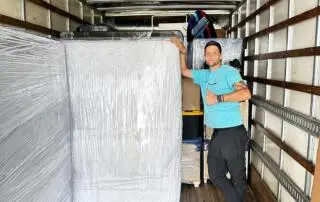
Table Of Contents:
- How to Choose Moving Services for Long-Distance Relocation
- Key Takeaways
- Define Your Long-Distance Relocation Requirements
- Researching Reputable Long Distance Moving Services
- Obtaining and Comparing Quotes for Your Interstate Move
- Evaluating the Reliability of Moving Services for Long Distance Relocation
- Understanding Contracts and Booking Your Chosen Long Distance Mover
- Preparing for Your Move With Long Distance Relocation Professionals
- Final Thoughts
- Frequently Asked Questions
How to Choose Moving Services for Long-Distance Relocation
Key Takeaways
- Choosing moving services requires a clear understanding of your belongings’ volume, timeline, and budget.
- Researching and comparing mover credentials, quotes, and customer satisfaction is essential.
- Understanding contracts and preparing for move day can save time and reduce moving stress.
Define Your Long-Distance Relocation Requirements
First, you must assess the scope of your long-distance move by determining the volume and nature of your belongings. This includes making an inventory of items such as furniture, boxes, and specialized items like desks or fragile electronics. Next, decide on your ideal moving timeline by considering when you need to vacate your current space and when you plan to settle in your new home. Special handling needs for delicate or valuable items, including custom crates or insurance for transport, should be noted. Establishing your budget early on ensures you compare the most cost-effective long distance moving options available. Lastly, list any potential challenges—such as difficult pickup locations or destination restrictions—to better prepare with the right logistics and customer support.
Assess the Volume and Nature of Your Belongings
When evaluating what you have, create a detailed checklist and take measurements if needed. This inventory planning not only informs your storage and moving needs but also helps determine the right size truck and moving quote.
Determine Your Ideal Moving Timeline
A clear timeline prevents last-minute surprises and aids in scheduling professional movers. Consider peak moving seasons and any potential delays due to weather or high demand.
Identify Any Special Handling Needs for Valuables or Fragile Items
Sensitive items may require extra layers of protection such as custom crating or climate control. Confirm with the mover about specialized handling procedures.
Establish Your Budget for Moving Services for Long Distance Relocation
Accurately estimate the total moving expense by including packing, transport, and additional fees, ensuring the quote matches your financial parameters.
List Potential Origin and Destination Challenges
Every move has its unique challenges—from narrow staircases to limited parking spaces. Listing these ahead of time allows you to choose a mover experienced with your specific relocation demands.
Researching Reputable Long Distance Moving Services
Research plays a vital role in ensuring the reliability of your long distance moving service. Start by seeking recommendations from friends, family, or real estate professionals who have had positive experiences. Utilize online directories and review platforms to identify interstate movers with strong reputations based on customer satisfaction and better business bureau ratings. Always verify company credentials and licensing to avoid scams and ensure compliance with relevant moving regulations. A company’s years of experience is a good indicator of its reliability and ability to handle diverse relocation needs. Finally, create a shortlist of potential moving services that meet your quality and budget requirements.
Seek Recommendations From Trusted Sources
Personal testimonials can provide insight into the quality of service and overall customer support.
Utilize Online Directories and Review Platforms for Interstate Movers
Websites offering verified customer reviews help assess service quality and reliability.
Verify Company Credentials and Licensing for Long Distance Relocation
Ensure the company is properly licensed and insured to protect against potential liabilities.
Examine Years of Experience in Long Haul Moving Services
A proven track record enhances trust and increases the likelihood of a smooth relocation.
Shortlist Potential Moving Services for Long Distance Relocation
Narrow your choices based on research findings, customer reviews, and cost–benefit analyses.
Obtaining and Comparing Quotes for Your Interstate Move
Begin by requesting in-home or video surveys from the movers to obtain accurate estimates. Understand the differences in moving estimates—binding, non-binding, and not-to-exceed types—to avoid hidden fees. Compare the scope of services offered in each quote carefully, noting both basic and additional services such as packing and storage. Inquire about valuation coverage and liability options to ensure that your belongings are protected during transit. Lastly, clarify all potential fees upfront so that you can decide on affordable long distance moving options without unpleasant surprises at delivery.
Request in-Home or Video Surveys for Accurate Estimates
Accurate surveys help in getting precise moving quotes tailored to your specific needs.
Understand Different Types of Moving Estimates
Different types of estimates can impact your final cost, so ask questions to understand these variations.
Compare the Scope of Services Offered in Each Quote
Evaluate if quotes include packing, storage, and insurance options that align with your requirements.
Inquire About Valuation Coverage and Liability Options
Protection plans differ among companies; knowing the details avoids future disputes.
Clarify All Potential Fees for Moving Services for Long Distance Relocation
Transparency in pricing is key for a hassle-free moving experience.
Evaluating the Reliability of Moving Services for Long Distance Relocation
Evaluate each mover’s reliability by checking consumer complaint histories and reading detailed customer testimonials available online. Pay attention to how professional and responsive their representatives are during your initial interactions. Confirm their process for handling claims and disputes, ensuring that they have a system in place for resolving any issues promptly. Additionally, ask about their tracking systems for shipments which can provide real-time updates on your move. Reliable movers often offer robust customer support, tailored logistics, and clear communication throughout the relocation process.
Check Complaint Histories With Consumer Protection Agencies
Reviewing agencies such as the Better Business Bureau can reveal patterns of unresolved issues.
Read Customer Testimonials and in-Depth Reviews
Real experiences shed light on the quality of service and operational efficiency.
Assess the Professionalism and Responsiveness of Company Representatives
Prompt responses and transparent communication are indicators of reliable service.
Confirm Their Process for Handling Claims and Disputes
A defined process protects you in case of damage or losses.
Ask About Their Tracking Systems for Shipments
Real-time tracking improves transparency and peace of mind during transit.
Understanding Contracts and Booking Your Chosen Long Distance Mover
Review your moving contract carefully before the booking. The bill of lading should detail the agreed services, pickup and delivery windows, and any special requirements. It is important to understand the payment schedules and accepted methods so that you can plan your finances accordingly. Clarify cancellation policies to know your rights if plans change. Finally, get written confirmation of all agreed-upon services to avoid disputes later.
Carefully Review the Bill of Lading and All Contractual Terms
Ensuring clarity in contract terms protects all parties involved in the move.
Confirm Pickup and Delivery Date Windows
Understanding the schedule guarantees that your move fits within your timeline.
Understand Payment Schedules and Accepted Payment Methods
Clear financial terms prevent unexpected charges.
Clarify Cancellation Policies and Associated Costs
Knowing these terms helps safeguard against changes in your moving plans.
Get Written Confirmation of All Agreed Upon Services
Documentation of agreements minimizes potential misunderstandings.
Preparing for Your Move With Long Distance Relocation Professionals
The final step involves preparing for the move day. Coordinate with the professionals for packing services or procure your own supplies based on their recommendations. Create a detailed inventory of all items to be moved to ensure clarity during transport and to simplify any claims if issues arise. Prepare your home by ensuring that pathways and doorways are clear for the movers. Communicate any last-minute changes to the moving service and make plans for the arrival and unloading process at your new residence. This preparation minimizes delays and helps maintain customer service quality and safety throughout the relocation.
Coordinate Packing Services or Obtain Packing Supplies
Ensure your belongings are properly secured during the move.
Create a Detailed Inventory of Items Being Moved
An inventory supports claims and tracks your items.
Prepare Your Home for the Movers’ Arrival
Clear pathways and accessible entry points speed up the process.
Communicate Any Last-Minute Changes to Your Moving Service
Keeping in touch with your mover avoids miscommunications.
Plan for the Arrival and Unloading Process at Your New Home
Organized arrival procedures set the stage for a smooth transition.
Final Thoughts
Cube Moving and Storage believes that careful planning and thorough research are key to a successful long-distance relocation. By defining your requirements, comparing quotes, and evaluating service reliability, you can avoid last-minute glitches and hidden fees. Understanding contracts and proper preparation further ensures a smooth process, leading to a stress-free move. I encourage you to take these steps for your next interstate move and experience exceptional service and peace of mind.
Frequently Asked Questions
Q: How do I know if a mover is reputable? A: Check online reviews, verify licensing, and consult organizations like the Better Business Bureau for confirmed reliability.
Q: What should my moving contract include? A: It should detail pickup and delivery dates, pricing, special services, cancellation policies, and liability coverage.
Q: Can I combine packing services with my move? A: Yes, many companies offer integrated packing and moving services to streamline the relocation process.
Q: How early should I book my long-distance mover? A: Booking 4–6 weeks in advance is recommended to secure availability and accurate estimates.
Q: What if my move schedule changes last minute? A: Ensure your contract includes flexible terms or cancellation policies to account for unexpected adjustments.




Leave A Comment